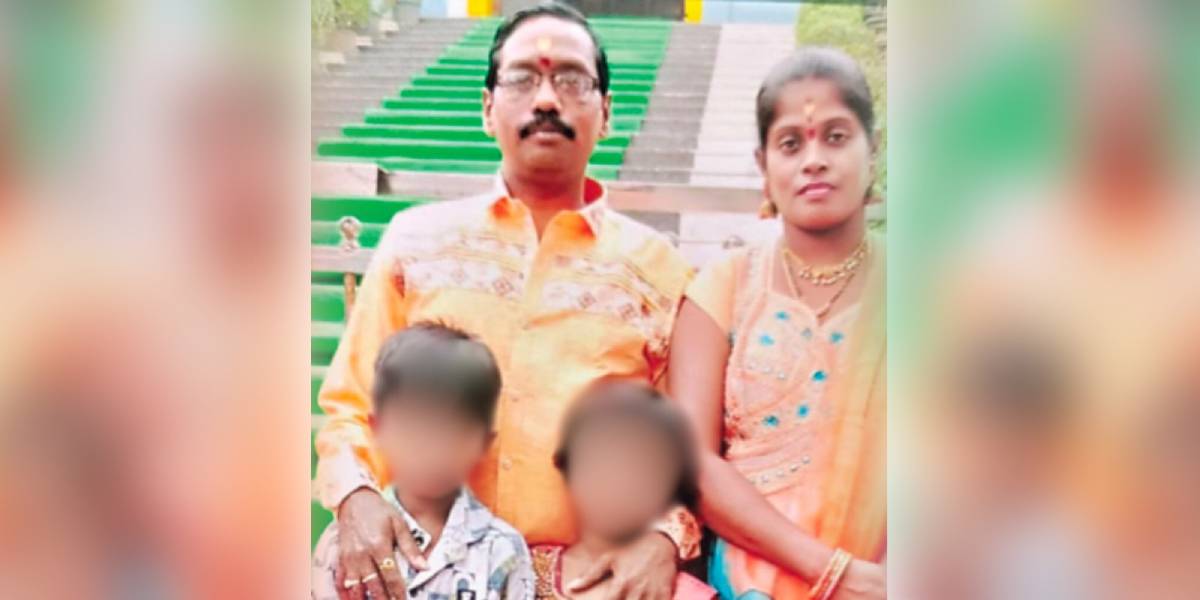The NHRC sought an explanation on why the next of kin of a woman, who died in the stampede, should not be provided a compensation of ₹5 lakh.
Published Aug 06, 2025 | 7:54 PM ⚊ Updated Aug 06, 2025 | 7:54 PM

Revathi with her family. (Supplied)
Synopsis: The NHRC observed a lapse in the management of public order and in initiating preventive measures. It directed the Commissioner of Police to submit a report in six weeks after conducting a fair probe.
Expressing dissatisfaction over the inefficiency in controlling the crowd that caused to a fatal stampede at a Hyderabad movie hall at the premier of Pusha 2: The Rule, the National Human Rights Commission (NHRC) issued a show-cause notice to the Chief Secretary of Telangana, seeking an explanation on why the next of kin of a woman, who died in the incident, should not be provided a compensation of Rs 5 lakh.
According to a complaint submitted to the NHRC, Revathi, a resident of Dilsukhnagar, died, and her two children were seriously injured during a stampede reportedly triggered by a lathi charge carried out by the Chikkadpally Police at the Sandhya theatre at RTC Crossroads on 4 December 2024.
The police resorted to a lathi charge to control a crowd surge caused by the arrival of actor Allu Arjun, the hero of the film, at the theatre.
The complaint alleged that a lack of police control and inadequate crowd management led to the chaos and the woman’s death.
Additional complaints were later filed by Sujatha Eslavath, Suresh Babu, Kotha Venkatesh, Rachala Yugander Goud, Thilak Reddy, and B Chandrasekhar.
Additional Commissioner of Police (Law & Order) submitted an action taken report on 20 March. The report said the ACP of the Chikkadpally Division had investigated the incident. The inquiry revealed that the event did not have official permission and that actor Allu Arjun was not authorised to hold a roadshow. The allegations of a police lathi charge were therefore deemed false.
The report further claimed that the complaint appeared to be an attempt to divert attention from the theatre management’s responsibility in the incident. Authorities asserted that crowd control measures typical of major film releases were in place, despite the lack of event permission.
The inquiry highlighted the inadequate infrastructure of the theatre, including limited parking and entry/exit points, which contributed to crowd congestion and the ensuing chaos.
The report said the police officers assigned for crowd management acted proactively during the unexpected gathering, and even saved the deceased woman’s son, who was transported to KIMS Hospital in Secunderabad for better treatment. The report also accused the complainant of attempting to damage the reputation of the police and misusing law enforcement resources by lodging false allegations.
Upon reviewing the available material, the NHRC noted that while the allegations of a lathi charge were unsupported, and the event did not have legal permission, serious concerns remained.
The NHRC expressed confusion as to why the police allowed a crowd to assemble and permitted the accused actor and management to proceed with an unauthorized event. The NHRC remarked that legal action should have been taken against the actor and the organizers at the first instance of the law being violated, well before the incident occurred.
It further noted that there must have been specific reasons for denying permission for the event, possibly the anticipation of accidents or injuries. Therefore, the NHRC held that the incident was not unforeseeable.
It also questioned whether the police had issued any warnings to the crowd, the management, or the actor about refraining from participating in unlawful activities, or whether authorities simply allowed the tragic sequence of events to unfold.
Given these unresolved concerns, the NHRC directed the Commissioner of Police, Hyderabad, to submit an additional report within six weeks.
In the second report submitted to the rights panel on 14 July, the police said permission was granted for previews at four theatres. It added that the actor was advised against visiting the Sandhya theatre. The report also mentioned the arrest of 10 people, including Allu Arjun, in connection with the incident.
The NHRC observed a lapse in the management of public order and in initiating preventive measures. It directed the Commissioner of Police to submit a report in six weeks after conducting a fair probe.
The commission directed its registry to issue a show-cause notice under Section 18 of the Protection of Human Rights Act, 1993, to the Chief Secretary regarding granting the compensation of ₹5 lakh to the woman’s family.
The case will be reviewed after six weeks.
